This article was written by Jackie Keenan on October 20, 2023 and was published by the Educating All Learners Alliance
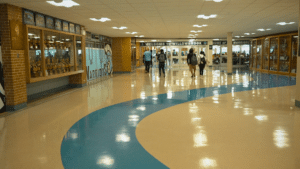
The EALA team arrived at O’Hare Airport on October 18, 2023. This marked the beginning of an educational adventure that would leave a lasting impact on all involved. As we set foot in the Windy City, our first stop was Madison’s Bar and Grill, where we had dinner and a chance to meet and greet attendees of the School Study Tour.
The next day, we dove headfirst into our mission by touring several educational institutions in the area. This included visits to Homer Junior High School, Willowbrook High School, Addison Trail High School, and the Transition Program for District 88, designed to cater to students aged 18-22. Each of these institutions offered a unique insight into the educational landscape. Witnessing the diversity in teaching, learning strategies, and administrative support was fascinating.
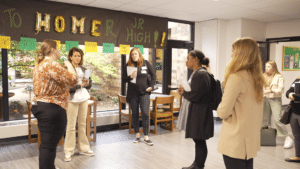
Attendees at Homer Junior High School being toured by Kristen Jurca.
We began our tour witnessing innovative teaching methodologies in action at Homer Junior High School. From co-taught Language Arts lessons to Adaptive P.E. and the Wilson Reading Program, attendees were able to observe a wide range of educational practices. Homer Junior High School provided insights into how educators are addressing the diverse needs of their students. Highlights from this tour were watching the co-teaching pairs and seeing the Adaptive .E. in action. It was evident that this school is committed to inclusivity and catering to all learners’ needs. The methods employed by their educators were seamlessly integrated. Our attendees appreciated the obvious preplanning and collaboration the Homer Junior High staff puts into their work. “This [visit to Homer Junior High] already made the trip [from Louisiana to Chicago] worth it,” said Justin Barron as we began taking our seats on the bus.
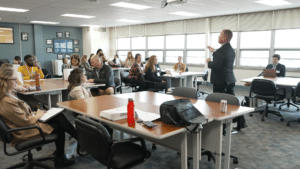
Principal Dan Krause of Willowbrook High School leading our whole-group reflection at the end of our tour.
In addition to classroom experiences, we were able to attend a period-by-period meeting at Willowbrook High School, which was akin to a monthly staff meeting. It was a unique opportunity to observe the collaborative nature of the faculty and their dedication to continuous improvement. A highlight of our visit at Willowbrook was witnessing students actively participating in student-centered models. During the meeting, students were helping out with the Brook Catering company, gaining valuable work experience by taking food orders and preparing hors d’oeuvres for the staff in attendance. The Brook Catering Company “[provides] students with basic lessons in culinary arts to skills that will be necessary for careers in the food service industry, catering and nutrition/menu planning” (Willowbrook High School). Other students were engaged in Project Lead the Way, exploring Engineering, Career and Technical Education (CTE), and Biomedical Sciences. The schools’ commitment to providing students with opportunities to acquire practical skills was very clear from the moment we began our tours with student leaders as our guides.
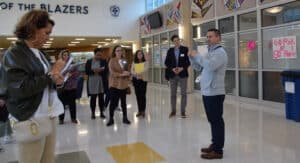
Principal Jack Andrews of Addison Trail High School leading attendees in a tour.
Addison Trail High School, our third stop on the tour, showcased a strong commitment to diversity and inclusion, particularly for the growing English Learner (EL) population. In classes like EL English and Sheltered Geo Science, educators created nurturing environments for students with diverse needs, ensuring they feel safe and supported. The Academic Success Center Tier II, serving as a skills lab, further emphasized Addison Trail’s dedication to fostering inclusivity by giving students a more individualized approach to learning by providing tutoring services and helping students create personalized academic goals. Their approach is a valuable example of how schools can accommodate the diverse needs of students while promoting an inclusive and equitable learning environment.
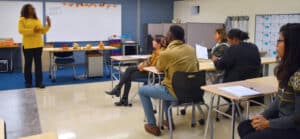
Attendees touring the Transition Academy.
Our tours were enriched further at the Transition Program for District 88. The Vocational Education Transition “program helps students with diverse needs obtain job training in a community setting and transition to life after high school” (DuPage High School District 88). The teachers and staff at the Transition Program exemplified a profound commitment to preparing students with diverse needs for life beyond high school, equipping them with essential job training and life skills through their daily lesson planning. Staff even stayed beyond school hours to show us around their classrooms, and we were truly grateful for this opportunity.
During our tours, one particular quote resonated deeply with us: “As a principal, you don’t drive instruction, you drive culture,” as stated by Dan Krause of Willowbrook High School. It served as a profound reminder of administrators’ pivotal role in shaping their schools’ ethos. The impact of a positive school culture cannot be underestimated in fostering effective teaching and learning environments.
We ended the day at Giordano’s Pizzeria for some Chicago-style deep-dish pizza. Attendees and EALA staff spoke about their main takeaways from the day, but also had time to get to know each other on a more personal level. There were conversations of past work history, family, and future plans. After a delicious meal and great conversation, we returned to our hotel to prepare for a full day of reflection early the next day.
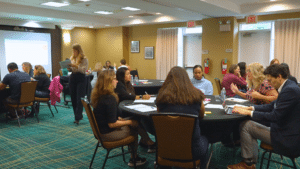
Attendees participating in our Reflection Summit with their advisors.
The Reflection Summit was a dynamic gathering of advisors and attendees who came together to focus on the implementation of Promising Practices and methodologies they would like to bring back to their home districts. The summit aimed to identify how schools plan to integrate the practices they’ve seen on these tours while also shedding light on the opportunities for growth and challenges they may encounter when doing so. Educators participated in three rounds of reflection: a small group reflection based on their role in education, a small group brainstorm with their school teams, and a final round of a whole group reflection. As we left the Reflection Summit, we did so with a renewed commitment to fostering inclusive education and a strengthened network of allies to support our efforts. One participant reflected on their journey, “The promising strategies have deepened my understanding of the whole inclusive movement to make sure everyone from the students, teachers, administrators, parents and community are involved in the education of our students”.
By forming an uncommon community of educators and leaders united by the common goal of centering best practices for students with disabilities and learning differences, we can bring about meaningful change. We left with a profound appreciation for the commitment of educators, administrators, and students in creating vibrant, inclusive, and dynamic learning environments. As we departed O’Hare Airport, we carried with us a deeper understanding of the power of culture in driving effective education and a renewed commitment to fostering such environments.